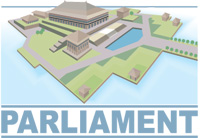Columns
Desertions, defections dominate as Govt. romps home at a canter
The sense of euphoria among ruling United People’s Freedom Alliance (UPFA) members that was prevalent when President Mahinda Rajapaksa presented his Government Budget to Parliament on October 24 had rapidly evaporated by the time the final vote on the Budget was taken on Monday. Within the course of the month, much had taken place within the political landscape of the country, some expected, others unexpected.
 What was expected was for President Rajapaksa to announce his intention to seek a third term in office and call for an early election, which he did announce on November 20. What was unexpected was that his main challenger in the upcoming poll would be none other than Maithripala Sirisena, a senior Cabinet Minister in his own Government. By the time the final vote on the Budget was taken on November 24, Mr Sirisena had decided to quit his portfolio and throw in his lot with an Opposition out to oust President Rajapaksa.
What was expected was for President Rajapaksa to announce his intention to seek a third term in office and call for an early election, which he did announce on November 20. What was unexpected was that his main challenger in the upcoming poll would be none other than Maithripala Sirisena, a senior Cabinet Minister in his own Government. By the time the final vote on the Budget was taken on November 24, Mr Sirisena had decided to quit his portfolio and throw in his lot with an Opposition out to oust President Rajapaksa.
The first sign of serious rumblings within the Government became apparent when two MPs of the Jathika Hela Urumaya (JHU), a constituent party of the UPFA, decided to stay away the day the vote on the Second Reading of the Budget was taken on November 1. However, the then Health Minister Sirisena showed no visible signs that he, along with several other MPs, were making plans to change sides soon, choosing to vote for the Budget. The UPFA secured 157 votes in its favour, with 57 against it.
Others, including Minister Sirisena and MPs Rajitha Senarathna, Duminda Dissanayaka and M.K.D.S. Gunawardena even participated in the Parliamentary debates on the Appropriation Bill, leaving many astounded when they announced days before the Budget was put to a final vote, that they were quitting the Government.
But that did little to stop the Government from securing a comfortable 152 votes, against 57 by the Opposition, during the vote taken by name. It was Leader of the House, Minister Nimal Siripala De Silva who asked for the vote by name, thus reinforcing the fact that the Government still had a two-third majority in the House, despite a few defections. While the numbers were more than sufficient, what seemed to be lacking was the high morale among Ruling Party MPs.
While the defecting MPs were expected to be present in the House on the day of the vote, they chose to stay away, thus dampening the enthusiasm of many who were present in the House to witness the cross over in the House. On the last day of the month-long debate, when the votes of the Ministry of Finance and Planning were being discussed, it was talk of possible changes in the political arena that came under discussion, more than economics.
While Opposition members used the floor of the House to speak of a regime change soon, Government members were confident that a few crossovers would do nothing to destabilise their Government. With just one sitting day scheduled for December, the only likely day before the January 8 poll, the fast happening changes within the political scene in the country could make it a place worth paying attention to.

